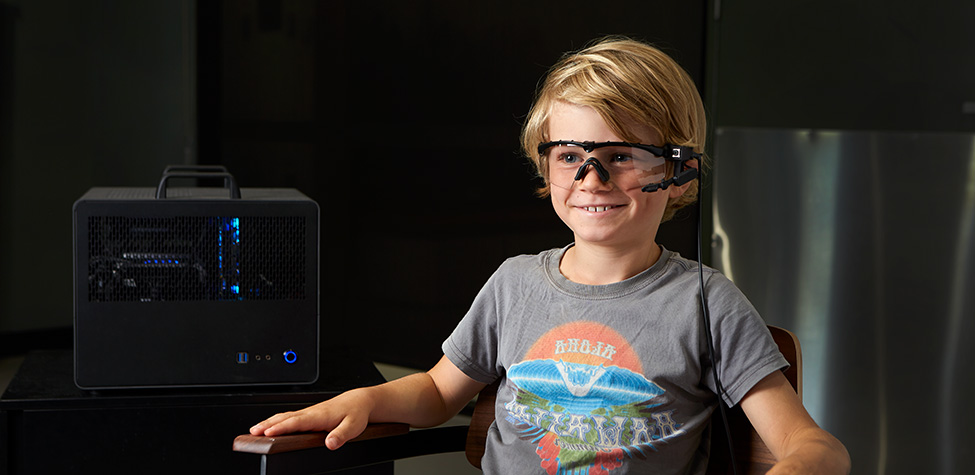Deakin’s pioneering research into obesity prevention – including its world-leading AI-driven youth project – has the potential to change billions of lives globally.
Without philanthropy though, this innovative and momentous work would simply not be possible. The University’s Global Centre for Preventive Health and Nutrition (GLOBE), is principally funded by the Ian Potter Foundation and supported by numerous other vital partnerships.
Awarded $590,000 from the Foundation, DIGITAL-YOUTH: An intelligent systems approach to monitoring harmful online advertising to children and youth, also has collaborative and advisory partners including VicHealth, Cancer Council Vic, QUIT, Responsible Gambling Foundation, FARE and The Australian Prevention Partnership Centre.
At a time when algorithms increasingly determine the content individuals see online, adolescents are particularly vulnerable to targeted messaging from advertising.
DIGITAL-YOUTH is allowing researchers to break down the formula for a marketing diet of harmful products by capturing and quantifying what appears on the screens of study participants aged 8–25.
The project’s vision is an online world where children and young adults are protected from commercial exploitation by industries selling unhealthy foods, e-cigarettes, alcohol and gambling.
Recently highlighted on the ABC TV program, Magda’s Big National Health Check, DIGITAL-YOUTH is led by Professor Kathryn Backholer. The series touched on the debate concerning personal versus societal responsibility, which Professor Backholer identifies as a key issue surrounding policy governance.
Professor Backholer says that beloved comedian Magda Szubanski, with her lived experience of health challenges, was the perfect host to balance a serious theme with lightness of tone. 'It was really fun being part of it, and Magda was very funny. I just laughed the whole time.'
It highlighted to the Australian population some of the systemic or environmental issues. How on earth do we expect people to try and maintain a healthy weight unless we tackle these societal issues?
Professor Kathryn Backholer
Co-Director, GLOBE, Deakin University
GLOBE’s work challenges politicians to create 'an environment that supports our children’s health and not the deep pockets of industry'.
Despite the World Health Organization (WHO) identifying the global challenge of monitoring unhealthy advertising to children, an oft-recited defence of the status quo is that digital marketing can’t be properly monitored because different people are served different content at different times.
That challenge provided the impetus for DIGITAL-YOUTH to devise a resource-efficient automated way to capture digital content for analysis. 'I rang a colleague in Deakin's Institute for Intelligent Systems Research and Innovation and said, "Do you want to brainstorm it together?", Professor Backholer recalls.
A Cancer Council Victoria Venture Grant, funding 'blue sky' ideas, then enabled the team to adapt military defence training iPupilX glasses, to the areas of public health to track the harmful marketing that youth are seeing as they go about their daily lives.
It’ll be the first time we can really show solid evidence on who these harmful industries are targeting, at what stage across the life course, and in what way.
Professor Kathryn Backholer
Co-Director, GLOBE, Deakin University
In a world-first, the Venture Grant enabled the development of a proof-of-concept AI-enabled system to automatically detect and classify unhealthy advertising online and in video or photographic footage.
The system, called SCANNER, is now being expanded to cover all food categories, plus gambling, alcohol, e-cigarettes and tobacco.
The project’s next stage involves recruiting 300-plus children and youth aged 8–11, 12–17 and 18–25, to collect data on their digital lives, which will be analysed using the SCANNER system, so that their exposure to and engagement with unhealthy digital marketing can be quantified.
'Because algorithmic targeting is done behind closed doors and it’s been such a resource-intensive task in the past, nobody has looked across the life course regarding when does marketing start for gambling, or for e-cigarettes,' Professor Backholer says.
Interested in finding out more?
Deakin's Institute for Health Transformation aims to strengthen health systems by transforming how we design and deliver health prevention and care, both in Australia and around the world. We are a global leader in population-level obesity prevention research, advancing action to reduce the prevalence of obesity effectively and equitably.

